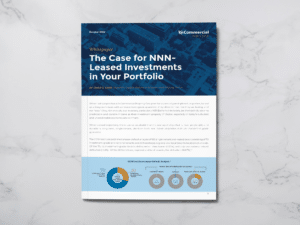InCommercial Capital: Pulling the Levers of Real Estate Solutions
An Interview with Restaurant Finance Monitor
Both Wes Staples and Marc Barber like solving the capital puzzle for restaurant operators. “It sounds nerdy, but one of the fun things about this job is solving capital issues,” said Staples. “How do we pull the levers of what is going to work for restaurant developers? How can everyone win and make money from deals?”
Indeed, that’s what makes Barber’s day, too: “How do we use our money to help you grow?” Barber is managing broker and Staples is vice president with InCommercial Property Group, a firm “focused on providing real estate capital for growing restaurant companies,” Barber reported. The company was started by real estate executive Erik Conrad in 2003, who launched the commercial brokerage with an SBA loan (West Town Realty). Today, they own or manage over 300 properties, mostly net leased.
As they’ve grown, they have increased the number of services they provide to single-tenant retail operators, including restaurants. Those solutions include:
• Joint Venture Equity
• Preferred Equity
• Mezzanine Debt
• Recapitalization/Sale of Partnership Interest
For the following services, InCommercial doesn’t directly provide them, but can arrange for their clients:
• Credit Facilities
• Permanent and Term Loans
• Construction Loans
“We have found that many of our competitors need clients to fit into their box,” said Barber. “We’re not focused on that. We’re working with our clients to tailor-make solutions to address their pain points” in the real estate process.
He finds most failures for restaurant developers happen early in the process, a place where InCommercial jumps in.
“As an operator you often have that first outlay of capital and you don’t get it back,” he explained. “We can provide capital to close on the land, or for construction, quickly.”
In fact, “we can contribute up to 100 percent of the capital stack,” Staples said.
They are also keen to provide sale/leaseback financing to multi-unit restaurant operators. “We feel like that’s a great way to monetize the real estate for the most value,” said Barber.
They target restaurant operators with more than 20 locations, with financing needs ranging from $1 million to $60 million. And, their term sheets are “friendly,” Barber explained. “Our term sheets aren’t overly onerous. We are putting together terms that don’t include points, for example. Our lending costs are market, or better-than market.”
Plus, while they work in large DMAs, they aren’t afraid to own locations in tertiary markets, either.
“Because we’ve owned in tertiary markets before, we can be comfortable with some of those other brands” other real estate companies aren’t, said Barber. “We think there is an opportunity gap in some of the smaller markets because they get ignored sometimes. Everyone needs to eat, and when the market has only a couple of options, you can get a bigger share of that market.”
For more information, contact Marc Barber at mbarber@incommercialre.com, or at (916) 717-2079.
Whitepaper: The Case for NNN-Leased Investments
InCommercial announces the release of its recent whitepaper titled: The Case for NNN-Leased Investments in Your Portfolio.
The whitepaper discusses the one asset class that is the most predictable and durable – long-term, single-tenant, absolute triple net-leased properties with an investment-grade guarantor.
Written by James G. Shaw, President at InCommercial Property Group.
Download Whitepaper: The Case for NNN-Leased Investments

Introduction:
When I tell people that at InCommercial Property Group we focus primarily on triple net properties, leased on a long-term basis with an investment-grade guarantor, they often tell me that they are boring, and not “sexy.” Okay, fair enough, but investors, particularly 1031 Exchange investors, are increasingly seeking predictable and durable income as their investment property of choice, especially in today’s turbulent and unpredictable economic environment.
When viewed objectively, there can be no doubt that the one asset class that is most predictable and durable is long-term, single-tenant, absolute triple net-leased properties with an investment-grade guarantor.
CCIM Institute Lease-Default Analysis:
The CCIM Institute published a lease-default analysis of 100 single-tenant, net-leased deals consisting of 70 investment-grade and national tenants and 30 franchisee, regional and local tenants located nationwide. Of the 70, no investment-grade tenants defaulted on their leases (0.00%) and only one national tenant defaulted (1.43%). Of the 30 franchisee, regional, and local tenants, five defaulted (16.67%) (1).
A 40-year study by Standard & Poor’s of corporate bond defaults between 1981 and 2021 (which included several recessions, including the Great Recession) found that corporations with an investment-grade rating experienced bond defaults at a rate of only 0.075% per year (2).
InCommercial Portfolios of Triple Net Lease Properties:
Looking at the portfolios of triple-net properties leased to tenants with an investment-grade guarantor owned and/or managed by InCommercial, there have been zero tenant defaults and zero mortgage defaults. Even during the peak of the pandemic, with the economy at a virtual standstill. We experienced 100% collection of contracted rents in our portfolios of net-leased properties with investment-grade guarantors (3). We are not aware of any other real estate asset class that can make a similar claim.
National Multi Housing Council Study:
For comparison, the National Multi Housing Council conducted a study of more than eleven million apartment units between April 2019 and December 2021 (4). They found that for occupied units, during all of 2021 (when the pandemic was waning) 22.1% were at least six days late in paying rent and 6.00% did not pay their rent at all in each month. Add that to the actual or projected vacancy rate and even an asset class perceived to be as low risk at apartment properties is not quite as predictable in its income stream as investment-grade, triple-net leased properties.
Predictable and Durable:
The predictable income streams of investment-grade net-leased properties are also durable. Typical lease terms for these properties range from 10 to 25 years and almost always contain tenant-controlled options to renew for multiple terms, potentially creating generational income streams. The net operating income from these properties is equally predictable as the tenants pay all expenses, including repairs and maintenance in an absolute net lease like those that make up most of the properties in our portfolios.
But what happens when single-tenant, net-leases do mature (expire)? InCommercial has managed more than one hundred lease maturity events (5). Of those we had ninety-nine successful renewals with an increase in rent; one non-renewal where the property was sold at a profit; one non-renewal that was re-tenanted and still owned; one non-renewal sold at a loss; and one non-renewal which is vacant and still owned.
Unpredictable and flashy may be exciting to some. So, label us boring if you wish but predictable certainty makes for a good night’s sleep and happy investors. Frankly, in today’s economic environment, that is just fine with us.
Download the full whitepaper HERE: The Case for NNN-Leased Investments
Sources:
(1) https://www.ccim.com/cire-magazine/articles/323688/2014/11/net-leased-single-tenant-risks/
(2) https://www.maalot.co.il/Publications/TS20220424121828.PDF
(3) InCommercial Property Group Portfolio Data
(4) https://www.nmhc.org/research-insight/nmhc-rent-payment-tracker/
(5) InCommercial Property Group Portfolio Data
InCommercial Hires New President, Capital Markets
Leading real estate company InCommercial Property Group announced that James G. Shaw has joined the firm as President of Capital Markets.
With over 40 years of experience, Jim is a respected authority in the industry. To date Jim has been involved with the acquisition, financing, management, disposition, and brokerage of investment real estate properties with an aggregate value of more than $4.5 billion on behalf of both institutional/corporate and individual investors.
In his new role, he will focus on designing and implementing capital market strategy as well as managing and expanding key industry relationships, strategic partners, clients, investors, and the development of new offering products.
Jim is a proud recipient of the 2007 ACE Award (Registered Rep) from TICA (the predecessor to ADISA) for excellence in professional performance and ethics.

Welcome aboard Jim!
Read the Biz Journal People on the Move feature here: https://bit.ly/3eUthfX
Why Dollar General is Poised to Thrive in a High-Inflation Environment
Inflation – surely a leading candidate for Merriam-Webster’s word of the year. It hides in plain sight and spares few. Businesses as well as consumers are struggling to adjust however some are better positioned than others to weather the storm. Below we explore three primary reasons why Dollar General will find itself in the winner’s category comparative to other notable retailers.
1) CONSUMER BEHAVIOR
As the largest discount retailer in the US by unit count, Dollar General serves demographics most effected by inflationary concerns. Of the 18,000+ Dollar General locations, the vast majority are strategically located in rural communities’ home to fewer than 20,000 and possessing limited retail options. As purchasing power wanes and fears of recession loom, discretionary spending is expected to drop at a greater rate than everyday essentials and consumables – something reflected in Dollar General’s product offerings.
While the Fed may be making the headlines, the consumer is facing the noise on the frontlines and corporate earnings reports have already begun to identify these shifts in consumer behavior. Illustrating this point, Dollar General CEO, Todd Vasos recently told analysts, “We’re already starting to see our core customers start to shop more intentionally.” He added, “Once that gas price reaches over $4 a gallon, which it has now, that we normally see the consumers stay closer to home, which bodes very well for that value and convenient message that we have out there for our core consumer.”
Lower price points, extreme proximity to consumers, and limited geographic competition continue to prove a massive competitive advantage for Dollar General – something Wall Street and Main Street agree on.
2) GROWTH – Opportunistic & Strategic
Logically, smaller price points create greater vulnerability when downward pressure on profit margins are experienced however Dollar General has pursued several new, expansionary business lines that aim to combat this and further fortify revenues.
Dollar General has recently introduced DG Market and pOpshelf to the market – two store concepts with increased store footprints, merchandise mix, and price points. By improving grocer offerings (both perishable and dry goods) via its DG Fresh rollout along with non-consumables, Dollar General is targeting an expanded demographic and consumer base.
Another expansion initiative Dollar General has identified is, healthcare. Vasos estimates 65% of all Dollar General stores are located within healthcare “deserts”. On the heels of CVS announcing the planned closures of 900 stores, Dollar General is uniquely positioned to challenge for market share by undercutting on price for over-the-counter products which enjoy higher margins than perishables.
These new initiatives are designed to supplement existing expansion plans as Dollar General leads all retailers in planned store openings with 1,102 slated for 2022 (10 of which planned to open in Mexico, representing the company’s first international expansion plans), with an additional 1,750 stores slated for remodels. These ambitions sit in stark contrast to only 25 announced closures. Meanwhile, Dollar General has targeted 1,000 pOpshelf locations by 2025.
3) EXPENSE MANAGEMENT
Look no further than recent earnings misses by other prominent retailers – most notably Walmart and Target – as prime examples of the significant headwinds retailers are currently facing. Dollar General has leveraged several key strategies to outperform.
First, Dollar General has displayed superior inventory management. The company’s increased emphasis on their private label goods has provided ideal optionality. Private labeling offers the company increased flexibility in consumable sizing, allowing reductions in size and/or volume offerings as pricing increases, effectively maintaining margins.
Vasos further outlined the importance of such flexibility. “Tougher times for the consumer normally means that she needs us more, and we normally start to see a trade-down once that occurs … that value and convenience really attract that trade-in, trade-down customer.” This also allows Dollar General to adjust to changes in consumer spending patterns and tweak product mix quicker. In aggregate, this decreases the need for price markdowns aimed at increasing inventory turnover which reduces both gross profit and profit margin.
Second, Dollar General has increasingly invested in technology expenditures to lower overhead. Self-checkouts have been added to 8,000 stores, nearly half of all corporate units. A small subset of these have been designed exclusively as self-checkout locations with zero employee-manned cashiers. These investments have effectively lowered the company’s reoccurring overhead and decreased its reliability on the increasingly fickle employment market.
Lastly, Dollar General has placed an emphasis on logistic infrastructure investment. Dollar General claims 75 percent of the US population currently lives within five miles of a Dollar General store presenting a staggering logistical undertaking. This requires the company to operate 28 traditional and DG Fresh distribution centers. To service their 18,000+ stores across 47 States, Dollar General has more than doubled their private fleet since 2021, accounting for approximately 40% of all outbound transpiration – a huge competitive advantage.
We’ve explored how Dollar General has positioned itself to weather the storm but more importantly, the numbers don’t lie. As reported by CNBC’s Melissa Repko, “Dollar General said it expects net sales growth of about 10% to 10.5% compared with its previous expectation of about 10%. It raised its same-store sales forecast to growth of approximately 3% to 3.5% compared with its previous expectation of 2.5%.”
These forecasts suggest the company should outpace inflationary concerns and outperform fellow retailers. It’s not hard to imagine Dollar General becoming a real winner of the post-pandemic retailscape.
Jon Hegwood is a Portfolio Manager with InCommercial Property Group.
Read the ConnectCRE article here: https://bit.ly/3bbWwsU
Company Pool Party Come Rain or Shine
The rain didn’t stop the InCommercial team from having a day filled with fun, food, libations, good conversation, swimming, Irish jigs, pickle ball and lots of laughs! InCommercial CEO, Erik Conrad, and his family graciously hosted a company pool party for the whole staff and their families. The bar was overflowing with refreshments of all types including the “punch” which was a crowd pleaser. Poochie’s was served for lunch and included delicious grilled burgers, veggie burgers, polish sausages and incredible cheddar fries. The pool was filled with kids laughing, splashing, and enjoying the day (rain or shine). The highlight of the party was being able to meet and spend time with all the team members outside of the office, especially those who flew or drove in from out of town! Many laughs and great conversations where had by all. Thank you, Conrad family, for hosting a wonderful company get together!
Observations from a CEO on Fatherhood & Success
With the InCommercial family growing along with the families of several employees, I was asked to share some advice on fatherhood – the implied bias being that with five kids, I’m clearly an expert as many reality tv shows clearly demonstrate.
I don’t want to give any advice – and before half of you scoff – I try not to ever give advice, but I do like to tell stories and make observations, which I hope is more palatable. And so, I have two observations about fatherhood that I think are universal –
First, being a father is a defining feature of my identity and the lens through which most of the world sees me, and yet, the only real criterion for success is being present. Countless barrels of ink have been spilled on the pressures on mothers to do and be everything while for fathers – showing up is enough, full stop – super dad. It may be naïve, but I think that lesson applies much more universally – showing up is way more than half the battle most of the time, if you can do it day in and day out, good days, bad days, purple daze – when we make someone or something else the priority, we succeed.
We accept the bad days because without them, there wouldn’t be good days and we keep coming back for more, unconditionally.
Secondly, everything is a phase. The good times, bad times, tantrums, food likes, dislikes, learning to ride a bike, baseball, soccer, pink, blue, mustard, ketchup, hormones, sweetness… it’s all a phase and no matter how challenging or rewarding it may be at the time, it’s like Chicago weather – just give it time and it’ll change.
So happy Father’s Day to the InCommercial dad’s and all the dad’s out there – keep calm and carry on!
– Erik Conrad, Founder & CEO













